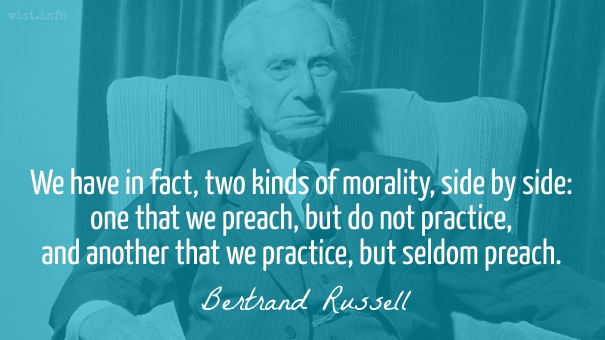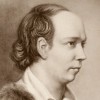When man appears before the Throne of Judgment, the first question he is asked is not: “Have you believed in God?” or “Have you prayed and observed the ritual?” He is asked: “Have you dealt honorably and faithfully in all your dealings with your fellow man?”
Quotations about:
actions
Note not all quotations have been tagged, so Search may find additional quotes on this topic.
There are large parts of the Christian ethic which are universally admitted to be too good for this wicked world. We have in fact, two kinds of morality, side by side: one that we preach, but do not practice, and another that we practice, but seldom preach.
When people come to see us, we foolishly prattle, lest we be inhospitable. But things said for conversation are chalk eggs. Don’t say things. What you are stands over you the while, and thunders so that I cannot hear what you say to the contrary.
Ralph Waldo Emerson (1803-1882) American essayist, lecturer, poet
“Social Aims,” lecture, Boston (1864-12-04), Letters and Social Aims (1875)
(Source)
Likely source of the abridgments more commonly found *in:More discussion of this quotation: What You Do Speaks So Loudly that I Cannot Hear What You Say – Quote Investigator
- "What you do speaks so loudly that I cannot hear what you say."
- "What you are speaks so loudly that I cannot hear what you say."
- "Who you are speaks so loudly that I cannot hear what you say."
- "What we are speaks louder than what we say." [John F Kennedy, Q&A, Salt Lake City (23 Sep 1960), and in numerous subsequent speeches]
We recognize that there are no trivial occurrences in life if we get the right focus on them.
Mark Twain (1835-1910) American writer [pseud. of Samuel Clemens]
The Autobiography of Mark Twain, Vol. 1 (2010)
(Source)
Say nothing of my religion. It is known to God and myself alone. Its evidence before the world is to be sought in my life: if it has been honest and dutiful to society the religion which has regulated it cannot be a bad one.
Thomas Jefferson (1743-1826) American political philosopher, polymath, statesman, US President (1801-09)
Letter to John Adams (11 Jan 1817)
(Source)
Instructions he gave to a biographer.
I have been a selfish being all my life, in practice, though not in principle.
Without courage, wisdom bears no fruit.
[Sin valor es estéril la sabiduría.]
Baltasar Gracián y Morales (1601-1658) Spanish Jesuit priest, writer, philosopher
The Art of Worldly Wisdom [Oráculo Manual y Arte de Prudencia], § 4 (1647) [tr. Maurer (1992)]
(Source)
(Source (Spanish)). Alternate translations:
Knowledge is barren, if Valour do'nt accompany it.
[Flesher ed. (1685)]
Knowledge without courage is sterile.
[tr. Jacobs (1892)]
Without courage, the mind is dead.
[tr. Fischer (1937)]
After all, when the day of judgement comes we shall be examined about what we have done, not about what we have read; whether we have lived conscientiously, not whether we have turned fine phrases.
[Certe adveniente die judicii, non quæretur a nobis quid legimus, sed quid fecimus; nec quam bene diximus, sed quam religiose viximus.]
Thomas à Kempis (c. 1380-1471) German-Dutch priest, author
The Imitation of Christ [De Imitatione Christi], Book 1, ch. 3, v. 5 (1.3.5) (c. 1418-27) [tr. Knox-Oakley (1959)]
(Source)
(Source (Latin)). Alternate translations:
At the day of judgment it shall not be asked of us what we have read, but what we have done: nor how well we have said, but how religiously we have lived.
[tr. Whitford/Raynal (1530/1871)]
On the day of judgment we will not be asked what we have read, but what we have done; not how well we have discoursed, but how religiously we have lived.
[tr. Whitford/Gardiner (1530/1955)]
Assuredly at the day of judgment we shall not be examined how many bookes we have read, but how many good workes we have done; not how rhetorically we have spoken, but how religiously we have lived.
[tr. Page (1639), 1.3.22]
A Day of Judgment there will come, where in Measures will be taken very different form ours; when the Enquiry, upon which our Affairs must all turn, will be, not how much we have Heard or Read, but how much we have done; not how Eloquent our Expressions, but how Pure and Devout our Lives; how much our Manners, not our Capacity or Breeding, our Wit or Rhetorick, distinguished us from common Men.
[tr. Stanhope (1696; 1706 ed.)]
Assuredly, in the approaching day of universal judgment, it will not be enquired what we have read, but what we have done; not how eloquently we have spoken, but how holily we have lived.
[tr. Payne (1803)]
Truly, at the day of judgment we shall not be examined what we have read, but what we have done; not how well we have spoken, but how religiously we have lived.
[ed. Parker (1841)]
Assuredly, in the approaching day of judgment, it will not be inquired of us what we have read, but what we have done; not how eloquently we have spoken, but how holily we have lived.
[tr. Dibdin (1851)]
Verily, when the day of judgment comes, we shall not be asked what we have read, but what we have done; nor how well we have spoken, but how religiously we have lived.
[ed. Bagster (1860)]
Of a surety, at the Day of Judgment it will be demanded of us, not what we have read, but what we have done; not how well we have spoken, but how holily we have lived.
[tr. Benham (1874)]
Truly, at the day of judgment we shall not be examined as to what we have read, but as to what we have done; not as to how well we have spoken, but as to how religiously we have lived.
[tr. Anon. (1901)]
On the day of judgment, surely, we shall not be asked what we have read but what we have done; not how well we have spoken but how well we have lived.
[tr. Croft/Bolton (1940)]
Surely on coming to the day of judgment we shall not be asked what we have read but what we have done: not how well we talked but how religiously we lived.
[tr. Daplyn (1952)]
At the Day of Judgement, we shall not be asked what we have read, but what we have done; not how eloquently we have spoken, but how holily we have lived.
[tr. Sherley-Price (1952)]
When the day of judgment comes, we shall not be asked what we have read, but what we have done, not if we made fine speeches, but if we lived religious lives.
[tr. Knott (1962)]
When the day of judgement comes we will be asked not what books we read, but what deeds we did, not how well we spoke, but how religiously we lived.
[tr. Rooney (1979)]
Surely, when the day of judgment comes we shall not be asked what we have read but what we have done, not how well we have spoken but how devoutly we have lived.
[tr. Creasy (1989)]












